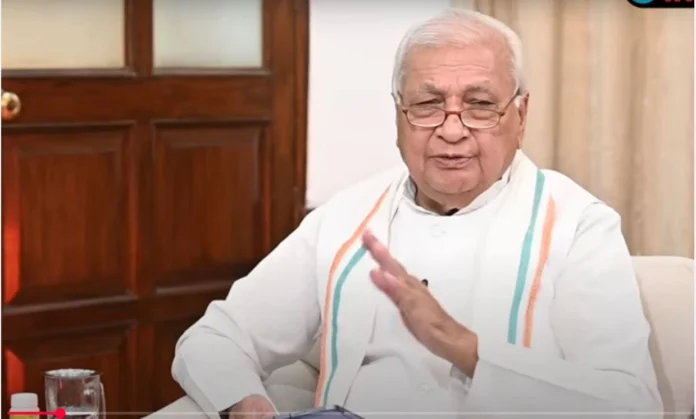Bihar Governor Arif Mohammed Khan has stirred a hornet’s nest by asserting that the word Waqf “finds no mention” in the Quran: “It goes against the grain of Quranic teaching,” Khan said in the interview.
“There is no mention of the word Waqf in the Quran, but the Quran does mention and asks people to spend money on the poor, deprived, destitute and the needy. In the light of this, possibly—and I repeat, possibly—it was thought that apart from individual charity, an institution can be created to look after the needy. And this, perhaps, is how the institution of Waqf came into being.”
Khan, unlike many politicians, is well-versed in Islamic theology and the Quran. He thus speaks with the authority of scholarship and conviction. He said: “Etymologically, Waqf means to detain and hold back. The Quran prohibits detaining money and insists on circulation. So if Waqf is used to detain or hold back money then it is un-Islamic.”
Elaborating on the Quranic spirit of charity, Khan said: “Who is there who will give a loan to God? The money which we spend on the poor and the needy is considered a loan—which means it will be paid back to you in greater measure. When you spend money for the poor, you are spending in the way of God. And this is in accordance with what the Quran preaches.” He added: “The Quran does not talk about doing good to others, but good to yourself. If you are spending money on the poor then you are doing good to yourself.”
Waqf Boards: A Billion-Dollar Failure?
Khan was unsparing in his indictment of how Waqf Boards have functioned—or rather, failed to. “In Delhi, Patna, Hyderabad or Bangalore, show me one Waqf institution working for the benefit of the poor?” he asked. “They have Waqf properties worth not millions, but billions of rupees. Show me one hospital that is working for those who are not able to afford treatment or one school for the needy?”
Citing shocking examples of alleged misuse, he continued: “In Bangalore there is a five-star hotel built on Waqf property and the lease is not for 20 or 30 years, but for 99 years. In the books, some paltry sum is coming to the beneficiaries. Is this believable? Is there nothing else to that transaction?” “How can a prime property given to run a five-star hotel be given away at a throwaway price? How is it possible?” he wondered.
Naming malls and residential buildings in Patna allegedly built on Waqf land, Khan charged that the Waqf Boards have “lost their way”. “The misuse is rampant,” he said.
Reform and Representation: The Case For A New Law
Against this backdrop, Khan endorsed the need for legislative reform, including the controversial inclusion of non-Muslims on Waqf Boards. “It is a paradox that we are applying religious laws in a secular democracy,” he said. “The Quran asks you to take care of non-Muslims, but does not ask non-Muslims to contribute to Waqf or create Waqf. Non-Muslims are meant to be taken care of by the Muslims—but so many distortions have happened, this being yet another one,” he said.
Khan also justified the inclusion of non-muslims on Waqf Boards, a move that has been criticised by those opposing the amendments and the new law. “If I as a non-Muslim have a right over a property as a beneficiary and I am not getting anything out of it, isn’t it my business to see how this property is being managed? My right is there, but it is being violated. So, should I be concerned or not? If I am not receiving the benefit due to me I will urge the Government to step in and ensure that my rights are not trampled upon,” he said. Calling Waqf Boards “dens of corruption and malpractice,” Khan noted simply: “Reforms were long overdue.”
Faith, Citizenship and The Politics of Victimhood
On the larger question of a trust deficit between Indian Muslims and the Modi government, Khan dismissed the narrative of perpetual victimhood. “When triple talaq was banned, the so-called Muslim leadership said that the move is to target Muslim men and put them in jail. How many Muslim men have been put in jail?”
“When the Citizen Amendment Act was brought in, the same leadership said it was not to give citizenship to the persecuted, but to deprive Muslims of their citizenship. How many Muslims have been deprived of their citizenship?” He asked bluntly: “If one is crying wolf all the time, why take such people seriously?”
Khan also objected to homogenizing the Muslim community. “You say Muslims—are they one monolithic group? By using this terminology, you make them feel as if they are not part of the mainstream. What is your definition of a Muslim? I consider myself a Muslim—but that is a relationship between me and my God. In public affairs, I am an Indian. So the real problem is in your mind. The fact that we try to put all of them in one category is, to my mind, very problematic. Go to any village and see that Hindus and Muslims cannot live without each other.”
“Integration, Not Intimidation”
Dismissing flashpoint issues like “love jihad” and “bulldozer justice” as media-fuelled distractions, Khan pivoted back to what he sees as real priorities: “To me, voices of integration are important; to me, the welfare schemes are important; to me, people getting houses, gas cylinders and food is important.” “In all the welfare schemes, Muslims have a share—often more.” Even bulldozer justice, he claimed, applied only to those “killing people randomly”.
The Way Forward
As a parting shot, Khan offered what may be the most telling quote of the conversation: “Have faith in India, India’s Constitution, India’s people, culture and civilization. There is no threat to any identity provided we remain Indians.”
—The writer is an author, journalist and political commentator


